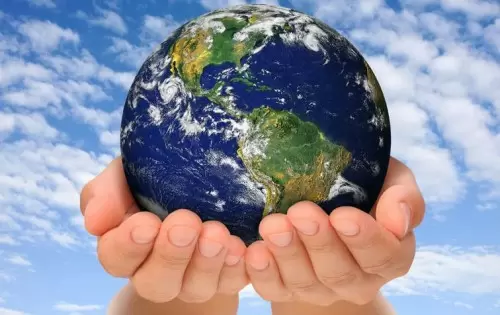D.C. can be naturally beautiful… for a few weeks in the fall and the spring, anyway. We've got over 7,000 acres of parks, almost 20 percent of the city, which is the second highest among all high-density U.S. cities.
Apart from that, this is a place that has been pretty relentlessly urbanized, with natural watercourses buried and most of the rest of the original terrain subsumed into the sublime guidance of the L'Enfant Plan.
But the city has its environmental successes to crow about… it has been a leader in urban ecosystem planning, and coordinated cleanup of the Potomac with neighboring states has seen bald eagles returning to the capital in increasing numbers in recent years.
And of course it goes without saying that D.C. is the natural place to be to either study or influence national environmental policy. What is decided here in the District can have lasting impacts both nationally and globally on questions such as carbon emissions, fracking, or endangered species protection.
What Can I Do with an Environmental Science Degree in Washington, D.C.
What can you do with an environmental science degree in Washington, D.C.? You can move the world, that's what. As the focal point for environmental policy of the most powerful nation on the planet, D.C. is a mecca for both federal environmental agencies and interest groups trying to sway them.
Agencies like the Environmental Protection Agency, the Forest Service, and the National Park Service are headquartered in or around D.C. and are the primary employers of environmental scientists in the District. But that's just the tip of the iceberg… most government functions today involve environmental considerations, so you can also find positions in the field at the Department of Defense, Department of Energy, or Bureau of Land Management.
In fact, it's not generally known that the Department of Defense is the country's fifth largest federal landholder… some of the largest pristine tracts of nature in the country have remained that way courtesy of the DOD's Readiness and Environmental Protection Integration Program, which has spent nearly $500 million over the past fifteen years on environmental efforts.
And if you genuinely want to work hands-on with the environment in DC, the NPS manages most of the parkland in the District.
But the feds aren't the only game in town. Whether it's at a non-profit like the Environmental Defense Fund or a corporate lobbying group like the Alpine Group, you will find them lining the corridors of power… and always in search of talented scientists.
The jobs here pay what you would expect for such important positions… according to the Bureau of Labor Statistics, most environmental and conservation science positions in DC earn between $88,740 and $130,000 annually.
2020 US Bureau of Labor Statistics salary figures and job growth projections for the professions listed reflect state data not school-specific information. Conditions in your area may vary. Data accessed September 2021.
Master's in Environmental Science in Washington, D.C.
To equip yourself properly for high-level discussion on environmental policy, you don't just need a degree; you need a master's degree. And you need one that delivers leadership skills and communication chops along with scientific knowledge and research experience.
Enter the American University MS in Environmental Science. It's a degree that is heavy in research and analysis of environmental issues, but with the high-level modeling, statistical training, and problem-solving skills that will turn you into a scientist with political savvy.
Of course, the D.C. location is ideal for studies and training of exactly that sort, which is why you will find programs like the George Washington University Master of Arts in Environmental Resource Policy here. The internship opportunities alone are worth the price of admission to these programs, putting you into direct contact with the agencies and people responsible for implementing environmental policy in the U.S. today.
Bachelor's in Environmental Science in Washington, D.C.
On your way to getting that critical master's degree, you're going to want to lay the foundation with a solid bachelor's in a related field. Washington D.C. has a few, including the BS in Environmental Studies at the Catholic University of America. Uniquely based in the university's School of Architecture and Planning, the program looks at the impact of man-made creations on the natural environment and ways to harmonize those interactions.
Also,Trinity Washington University delivers a solid base education in biological science that you can use as a foundation for almost any advanced degree.







